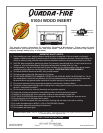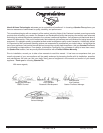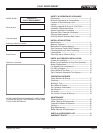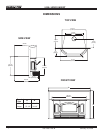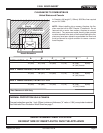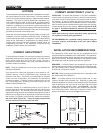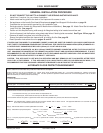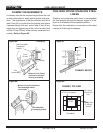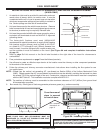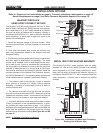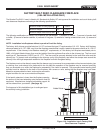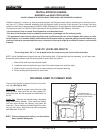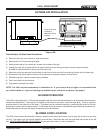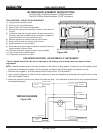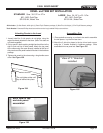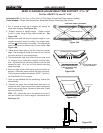
5100-I WOOD INSERT
Page 6
January 30, 2004
R
250-1960 Rev B
AVOID FIRE: To ensure that insulation or any other combustible
material does not contact the chimney, a chimney inside the house
must have at least 2 inches (51mm) of air space clearance around
t
he chimney. A chimney outside the house must have at least 1
inch (25mm) clearance to the combustible structure. Noncombus-
tible re stops must be installed at the spaces where the chimney
passes through oors and/or ceilings. Refer to Figures 8A & 8B
on page 8. Canadian installations require a full reline of the
chimney
CHIMNEY HEIGHT/DRAFT
To be sure that your Quadra-Fire insert burns properly, the chimney
draft (static pressure) should be approximately -0.10” water column
(W.C.) during a high burn and -0.04” W.C. during a low burn,
measured 6” (152mm) above the top of the insert after one hour of
operation at each burn setting.
NOTE: These are guidelines only, and may vary somewhat for
individual installations.
Your Quadra-Fire insert was designed for and tested on a 6”
(152mm) chimney, 12 ft-14 ft (360-420cm) high, measured from
the base of the insert. The further your stack height or diameter
varies from this configuration, the possibility of performance
problems increases. In addition, exterior conditions such as roof
line, surrounding trees, prevailing winds and nearby hills can
inuence insert’s performance.
A masonry chimney or a listed factory-built UL103 HT Class “A”
chimney must be the required height above the roof and any other
nearby obstructions. The chimney must be at least 3 ft (91cm)
higher than the highest point where it passes through the roof and at
least 2 ft (61cm) higher than the highest part of the roof or structure
that is within 10 ft (305cm) of the chimney, measured horizontally.
See 2-10-3 Rule (Figure 6A). These are safety requirements
and are not meant to assure proper ue draft.
3 ft Min
(91cm)
2 ft Min (61cm)
10 ft Min
(305cm)
2-10-3 RULE
Figure 6A
NOTE: Clearances may only be reduced by means approved by
the regulatory authority having jurisdiction.
WE RECOMMEND that a qualied building inspector and your
insurance company representative review your plans before
installation.
INSTALLATION RECOMMENDATIONS
The Quadra-Fire 5100-I Insert has met and surpassed the most
stringent emissions standards in the United States. The sophistica-
tion of the interior rebox design requires that a proper draft be sup-
plied by the chimney, therefore adherence to the following factors
will enable your insert to operate at its optimum capability.
REQUIRED: A minimum starter pipe reaching to the base of the
existing code approved masonry chimney and an airtight face seal,
but a full chimney liner for factory-built replaces is recommended
for USA and is required in Canada.
BETTER: Direct connection to the rst ue liner in accordance with
the requirements of the NFPA 211.
BEST: A complete relining of the chimney system with a 6 inch
(152mm) diameter listed, stainless liner. Required for factory-built
replace installations in Canada, recommended in USA. The sections
must be attached to the insert and to each other with the crimped
(male) end pointing toward the insert. See Figure 6B. All joints,
including the connection at the ue collar, should be secured with
three sheet metal screws. Make sure to follow the minimum clear-
ances to combustibles as set out on Page 5 of the manual.
These installation instructions describe the installation and opera-
tion of the Quadra-Fire 5100-I Wood Insert. This insert meets the
U.S. Environmental Protection Agency’s 1990 particulate emission
standards. The 5100-I is listed by OMNI-Test Laboratories, Inc.
to UL Safety Standard 1482, and ULC S628, and (UM) 84-HUD.
The 5100-I is approved for mobile home installations when not
installed in a sleeping room and when an outside combustion air
inlet is provided. The structural integrity of the mobile home oor,
ceiling, and walls must be maintained. The insert must be properly
grounded to the frame of the mobile home.
Check with your local building code agency before you begin your
installation to ensure compliance with local codes, including the
need for permits and follow-up inspections. Be sure local building
codes do not supersede UL specications and always obtain a
building permit so that insurance protection benets cannot be
unexpectedly cancelled. If any assistance is required during
installation, please contact your local dealer.
LISTINGS
CHIMNEY HEIGHT/DRAFT (CONT’D)
LINER CONNECTOR
FLUE
GAS
DIRECTION
TOWARDS
STOVE
Figure 6B



